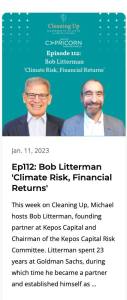Join getAbstract to access the summary!

Join getAbstract to access the summary!
Bob Litterman and Michael Liebreich
Climate Risk, Financial Returns
Cleaning Up - Leadership in an Age of Climate C..., 2023
What's inside?
Climate change poses enormous systemic risk to financial markets and to the global economy.
Recommendation
Climate change has financial ramifications, and stakeholders are placing more emphasis on risk management protocols to assess and account for climate threats. On the Cleaning Up media platform, moderator Michael Liebreich interviews finance expert Bob Litterman on financial risk management in the context of climate. Litterman, a former Goldman Sachs economist, argues that time is of the essence in addressing the costs of global carbon emissions. Executives interested in a robust assessment of risk management in an era of climate change will find this an informative analysis.
Summary
About the Speakers
Bob Litterman is a founding partner at Kepos Capital. Michael Liebreich hosts the Cleaning Up media platform, which focuses on clean energy, climate dynamics and sustainability issues.


















Comment on this summary